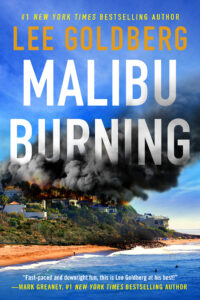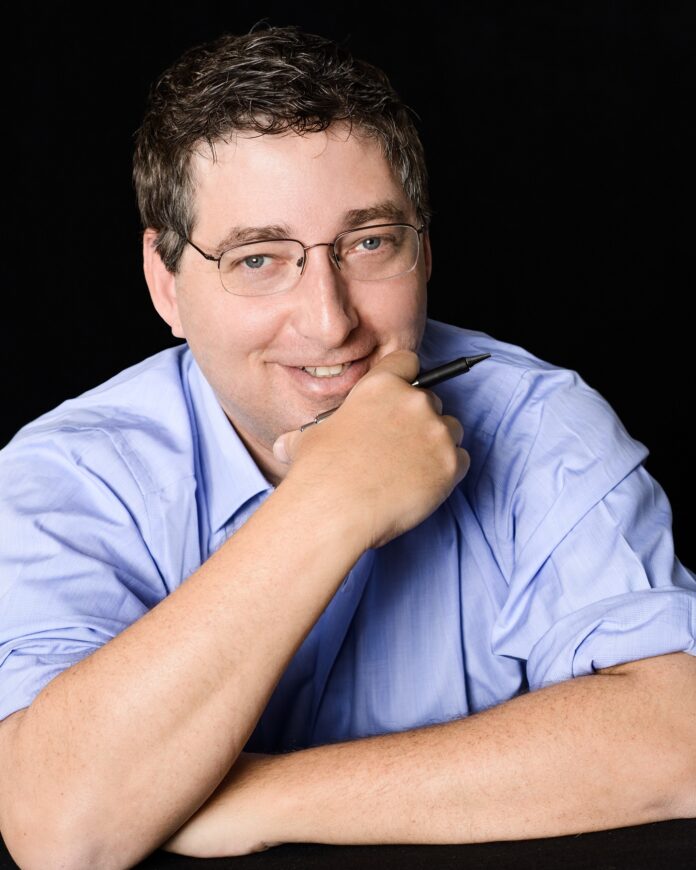Welcome Lee, we’re excited to have you on Reader’s Entertainment. First, tell our readers a bit about yourself. Where you’re from, where you live? Is writing your full-time job?
I’m from Walnut Creek, California, in the San Francisco Bay Area. Now I live in Calabasas, California, which is in the San Fernando Valley, and I’ve been a full-time writer since the day that I graduated from UCLA – which makes me the luckiest guy I know.
How long have you been writing?
When I was ten or eleven, I was already pecking novels out on my Mom’s old typewriter. The first one was a futuristic tale about a time-traveling cop born in an underwater sperm bank. I don’t know why the bank was underwater, or how deposits were made, but I thought it was very cool. I followed that up with a series of books about a gentleman thief, which was a thinly disguised rip-off of Simon Templar, aka The Saint. I sold these stories for a dime to my friends in our cul-de-sac and even managed to make a dollar or two. In fact, I think my royalties per book were better than they are now.
I continued writing unpublished novels all through my teenage years. By the time I was 17, I was writing articles for The Contra Costa Times and other San Francisco Bay Area newspapers and applying to colleges. Once I got into UCLA, I put myself through school as a freelance writer for American Film, Los Angeles Times Syndicate, UPI, Newsweek. Anybody who would pay me. I had a girlfriend who worked at Playgirl and she got me a gig writing sexually explicit Letters-to-the-Editor for $25 each.
Most of the articles I wrote were interviews with novelists or people in the entertainment industry, so it was like getting a graduate school education in publishing and the movie business for free… better yet, I was paid for it!
I had a journalism advisor, Lewis Perdue, at UCLA who wrote spy novels. We became friends and talked a lot about mysteries, thrillers, plotting, etc. One day in the early 80s his publisher came to him and asked him if he’d write a “men’s action-adventure series,” sort of the male equivalent of the Harlequin romance. He said he wasn’t desperate enough, hungry enough, or stupid enough to do it…but he knew someone who was: Me. So, I wrote an outline and some sample chapters and they bought it. The book was called .357 Vigilante (aka The Jury Series). I wrote it as “Ian Ludlow” so I’d be on the shelf next to Robert Ludlum who was, at the time, the best-selling author in America.
The West Coast Review of Books called my literary debut “as stunning as the report of a .357 Magnum, a dynamic premiere effort,” singling the book out as “The Best New Paperback Series” of the year. I ended up writing four books in the series. Naturally, the publisher promptly went bankrupt and I never saw a dime in royalties.
But New World Pictures bought the movie rights to .357 Vigilante and hired me to write the screenplay. I didn’t know anything about writing scripts…luckily, I had a good friend who did, William Rabkin. We worked together on the UCLA Daily Bruin. So the two of us teamed up. The movie never got made, but we had so much fun that we were writing partners for over 20 years. We went on to write and produce hundreds of hours of television together, including the series Diagnosis Murder, Baywatch, Hunter, SeaQuest, and Monk. We’re still good friends to this day, though I’ve been writing scripts on my own for well over a decade now.
What does your typical writing day look like?
I do my best writing between 7:30 p.m and 2 a.m, then I wake up at 10, and spend the day revising what I wrote the night before, while also taking care of business, like reading manuscripts (for my publishing company Brash Books), proofing galleys of my previous books before publication, having meetings, and doing interviews like this. Then I have dinner and start writing fresh after dessert.
Tell us about your latest release? Where the idea came from?
I’ve had the central notion for Malibu Burning bouncing around in my head for years and I guess the time was finally right to tackle it. I was looking to write a new kind of crime procedural, one that was different from my own “Eve Ronin” crime novels, but also from all the other cop series out there. On top of that, I missed writing about heists and cons, which I hadn’t done since I left the Fox & O’Hare series that I’d co-authored with Janet Evanovich. And I wanted to tell a crime story in a new way, with a dual timeline — one that starts in the past and one that’s set firmly in the present — that eventually collide. It was challenging on a lot of levels, but also great fun.
Could you share one detail from your current release with readers that they might not find in the book?
The climax of Lost Hills, the first novel in my “Eve Ronin” police procedural series, was set within a massive wildfire in the Santa Monica Mountains. When I started thinking about the fire for Malibu Burning, which is also set in Los Angeles, it felt like I was repeating myself…but instead of running from that notion, I embraced it. I made it the same fire as the one in Lost Hills, only this time seen from a different perspective. Not only that, but the detectives in Malibu Burning are members of the Los Angeles County Sheriff’s Department, as is Eve Ronin, the heroine of Lost Hills. So it all fit together.
If you could be one of your characters for a day, which character would it be?
Danny Cole, the con man/thief in Malibu Burning. He’s equal parts Bret Maverick (I’m dating myself with that reference), Simon Templar (and with that one, too), and Thomas Crown (okay, with all three!), all in one extremely confident individual who has enormous amount of fun staging a complex con.
What’s your take on research and how do you do it?
Research is absolutely essential, at least for a crime procedural, to give the novel a sense of authenticity, which cons readers into suspending their disbelief and going along with all the stuff I actually made up… or that would never happen.
In the case of Malibu Burning, I didn’t know anything about firefighting or arson investigation when I started, so I had to do a massive amount of research — interviewing experts and reading tons of books and articles.
For my Ian Ludlow trilogy, and earlier for the five Fox & O’Hare books, all of which were international thrillers, I traveled all over the world so I could accurately describe the foreign locales where my stories took place. Lots of authors rely upon guidebooks, Google Earth, or episodes of Rick Steves and Anthony Bourdain’s travel shows. But I believe nothing beats “being there” for finding the key details that will make the place come alive for the reader. Also, I think that experiencing a place subtly imbues all your writing about it…even how the characters interact.
Speaking of research, for this book I came up with an arson technique that had never been done before, and when I posed it to investigators, they were worried and intrigued by the implications. One of the experts was so fascinated by my technique that he used it to set some fires in his backyard under various scenarios just to see what evidence was left behind…and if they’d be able to detect the arson if my technique was ever used. And then he sent me the videos of his experiments. That was so cool.
Are there any particular authors that have influenced how you write?
So many…but certainly Gregory McDonald, Elmore Leonard, Robert B. Parker, Larry McMurtry, Janet Evanovich, Lawrence Block, Donald Westlake, Agatha Christie, Garry Disher, Daniel Woodrell, Lee Child, Sue Grafton, Thomas Perry, and Michael Connelly, to name a few. And I am proud, and delighted, to say that many of those authors became my friends.
Do you have a secret talent readers would be surprised by?
I do a lot of BBQing and meat-smoking.
Your favorite go to drink or food when the world goes crazy!
KFC, Diet Coke and Oreos.
What is your writing kryptonite?
Old television shows, especially those cheesy, dated, 1970s Quinn Martin Productions like Cannon, Streets of San Francisco, Dan August, The FBI and Barnaby Jones. If I start watching one of those shows, no matter how simple and cliched it might be, I get sucked in and forget all about writing. The problem is that I stumble across them all the time on YouTube and, the next thing I know, I’ve lost three hours of my life.
Thank you so much for joining us today,Lee! Wow, what an amazing, and fun writing career!
Reader’s, Lee’s MALIBU BURNING releases today::
 Hell comes to Southern California every October. It rides in on searing Santa Ana winds that blast at near hurricane force, igniting voracious wildfires. Master thief Danny Cole longs for the flames. A tsunami of fire is exactly what he needs to pull off a daring crime and avenge a fallen friend.
Hell comes to Southern California every October. It rides in on searing Santa Ana winds that blast at near hurricane force, igniting voracious wildfires. Master thief Danny Cole longs for the flames. A tsunami of fire is exactly what he needs to pull off a daring crime and avenge a fallen friend.
As the most devastating firestorms in Los Angeles’ history scorch the hills of Malibu, relentless arson investigator Walter Sharpe and his wild card of a new partner, Andrew Walker, a former US marshal, suspect that someone set the massive blazes intentionally, a terrifying means to an unknown end.
While the flames rage out of control, Danny pursues his brilliant scheme, unaware that Sharpe and Walker are closing in. But when they all collide in a canyon of fire, everything changes, pitting them against an unexpected enemy within an inescapable inferno.
Malibu Burning: https://www.amazon.com/Malibu-Burning-Lee-Goldberg-ebook/dp/B0B2P7PWDD/
Lost Hills: https://www.amazon.com/Lost-Hills-Eve-Ronin-Book-ebook/dp/B07JW53H22
Social Media Links
https://www.facebook.com/AuthorLeeGoldberg/
http://twitter.com/LeeGoldberg
https://www.instagram.com/leegoldberg007/
Youtube: @LeeGoldberg007
@leegoldberg.bsky.social






